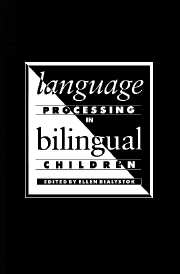Book contents
- Frontmatter
- Contents
- List of figures
- List of tables
- List of contributors
- Preface
- Introduction
- 1 Language modules and bilingual processing
- 2 Phonological processing in two languages
- 3 Second-language learning in children: a model of language learning in social context
- 4 Interdependence of first- and second-language proficiency in bilingual children
- 5 Giving formal definitions: a linguistic or metalinguistic skill?
- 6 Metalinguistic dimensions of bilingual language proficiency
- 7 Translation skill and metalinguistic awareness in bilinguals
- 8 Towards an explanatory model of the interaction between bilingualism and cognitive development
- 9 Constructive processes in bilingualism and their cognitive growth effects
- 10 Language, cognition, and education of bilingual children
- Index
7 - Translation skill and metalinguistic awareness in bilinguals
Published online by Cambridge University Press: 11 January 2010
- Frontmatter
- Contents
- List of figures
- List of tables
- List of contributors
- Preface
- Introduction
- 1 Language modules and bilingual processing
- 2 Phonological processing in two languages
- 3 Second-language learning in children: a model of language learning in social context
- 4 Interdependence of first- and second-language proficiency in bilingual children
- 5 Giving formal definitions: a linguistic or metalinguistic skill?
- 6 Metalinguistic dimensions of bilingual language proficiency
- 7 Translation skill and metalinguistic awareness in bilinguals
- 8 Towards an explanatory model of the interaction between bilingualism and cognitive development
- 9 Constructive processes in bilingualism and their cognitive growth effects
- 10 Language, cognition, and education of bilingual children
- Index
Summary
Scholars and educators have studied the effects of bilingualism on cognitive and linguistic abilities for almost a century. The question has generally focused on how a child with more than one language mentally organizes language, and on the repercussions of bilingualism on cognitive and linguistic development. Both these questions grew out of what might be called the monolingual-norm assumption: the belief that monolingualism is the cognitive-linguistic norm and that the child's cognitive system is fragile and designed to cope with only one language. The monolingual-norm assumption gave rise to the negative myths surrounding bilingualism: bilingualism has been blamed for cognitive, social, and emotional damage to children (see Hakuta, 1986, for review).
Recent research, however, does not support the view that simply speaking two languages taxes either the cognitive or the linguistic system. Studies of balanced bilinguals (bilinguals who have roughly equivalent abilities in the two languages) have suggested that bilingualism has a positive effect on cognitive development, especially under certain conditions of additive bilingualism where both languages are supported academically and emotionally by both the community and the society at large. The influence of the environment plays a large role in determining whether the bilingual situation will be additive or subtractive (Lambert, 1975).
- Type
- Chapter
- Information
- Language Processing in Bilingual Children , pp. 141 - 166Publisher: Cambridge University PressPrint publication year: 1991
- 85
- Cited by



